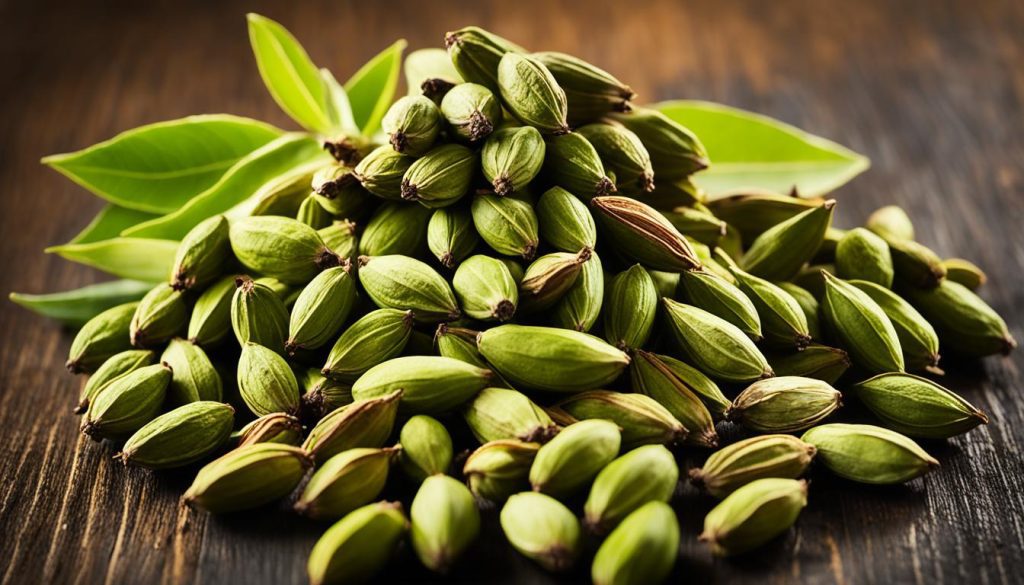Chronic inflammation can contribute to various health issues, including diabetes and cancer. That’s why it’s important to incorporate anti-inflammatory foods into your diet.
In this article, I will explore the science behind 7 herbs and spices that have been found to help fight inflammation naturally. These herbal remedies can provide effective relief and support your overall well-being.
Let’s dive into the world of anti-inflammatory herbs and discover their incredible healing properties.
Herbs to Treat Inflammation
- Incorporating herbs and spices into your diet can reduce inflammation naturally.
- Ginger, garlic, turmeric, cardamom, black pepper, ginseng, and green tea are powerful anti-inflammatory herbs.
- These herbs can help lower inflammatory markers in the body and promote healing.
- Consult with a healthcare professional before adding any new supplements or remedies to your routine.
- Adopt a holistic approach to inflammation to support your overall health and well-being.
Ginger – A Powerful Anti-Inflammatory Herb
Ginger is a versatile herb that possesses remarkable anti-inflammatory properties. It contains several active compounds, such as gingerol and zingerone, which have been shown to reduce inflammatory markers in the body. Studies have demonstrated that incorporating ginger into your diet or taking ginger supplements can effectively reduce inflammation and alleviate pain, especially in conditions like osteoarthritis.
Not only is ginger a flavorful addition to meals and beverages, but it also offers numerous health benefits. Its anti-inflammatory properties make it an excellent choice for individuals seeking natural ways to reduce inflammation and promote overall well-being.
One popular form of ginger is ginger tea, which can easily be made by combining fresh ginger slices with hot water and a touch of honey or lemon. Ginger can also be added to stir-fries, soups, and smoothies to enhance both the taste and the anti-inflammatory benefits.
The Benefits of Ginger in Inflammation Reduction:
- Reduces inflammatory markers in the body
- Alleviates pain, particularly in conditions like osteoarthritis
- Offers natural and holistic inflammation-fighting effects
- Can be incorporated into various dishes and beverages
Garlic – A Natural Anti-Inflammatory Remedy
When it comes to reducing inflammation naturally, garlic is a powerful herbal remedy that deserves a place in your kitchen. Not only does garlic add a delicious flavor to your meals, but it also provides numerous health benefits, including its anti-inflammatory properties.
Garlic is rich in sulfur compounds, such as allicin, which have been found to have anti-inflammatory effects in the body. Research has shown that these compounds can help reduce blood levels of inflammatory markers, such as C-reactive protein, while increasing antioxidant levels to combat oxidative stress.
One of the easiest ways to incorporate garlic into your diet is by adding it to your meals. Whether you’re cooking a savory stir-fry or whipping up a flavorful pasta sauce, simply mince or crush a few cloves of fresh garlic and sauté them in olive oil before adding the rest of your ingredients.
For those who prefer a more convenient option, garlic supplements are also available. These supplements typically contain concentrated amounts of allicin and other beneficial compounds found in garlic, making it easier to obtain the anti-inflammatory benefits without the strong taste and odor associated with fresh garlic.
Regardless of whether you choose to consume garlic in its fresh form or opt for supplements, it’s important to note that garlic should be used as a complementary treatment and not a replacement for medical advice. If you’re experiencing chronic inflammation or any other health concerns, it’s always best to consult with a healthcare professional.
So, the next time you’re cooking up a delicious meal, don’t forget to reach for some garlic. By incorporating this natural anti-inflammatory remedy into your diet, you can take a proactive approach towards reducing inflammation and promoting overall well-being.
Turmeric – A Potent Anti-Inflammatory Spice
Turmeric, a vibrant yellow spice commonly found in curry dishes, has gained popularity for its potent anti-inflammatory properties. This powerful herb contains a compound called curcumin, which has been extensively studied for its ability to reduce inflammation naturally.
Research has shown that curcumin can effectively lower inflammatory markers in the body, offering relief from conditions like osteoarthritis and other inflammatory conditions. Its anti-inflammatory effects are comparable to some non-steroidal anti-inflammatory drugs (NSAIDs), but with fewer side effects.
To enhance the absorption of curcumin and maximize its therapeutic benefits, it is recommended to consume turmeric with black pepper. Black pepper contains piperine, a compound that enhances the bioavailability of curcumin, making it more effective in reducing inflammation.
There are various ways to incorporate turmeric into your diet. You can add it to dishes, create flavorful turmeric teas, or even take turmeric supplements. However, it’s important to note that the active compound, curcumin, is not easily absorbed by the body. Therefore, consuming turmeric with a source of fat and black pepper can greatly enhance its absorption and anti-inflammatory effects.
By including turmeric in your daily routine, you can embrace a holistic approach to inflammation and promote natural healing. Its antioxidant and anti-inflammatory properties make it a powerful herb for reducing inflammation and supporting overall well-being.
Cardamom – An Inflammation-Reducing Spice
When it comes to tackling inflammation, cardamom is a powerful herb that shouldn’t be overlooked. Not only does it add a delightful flavor to your recipes, but it also offers numerous health benefits thanks to its anti-inflammatory properties.
Studies have shown that cardamom has the ability to reduce inflammatory markers in the body, helping to soothe inflammation and promote optimal health. Additionally, this versatile spice has been found to increase antioxidant levels, further supporting the body’s natural defense against inflammation.
For individuals with conditions like prediabetes or fatty liver disease, incorporating cardamom into their routine can make a significant difference. Research has revealed that taking cardamom supplements can greatly reduce inflammatory markers and improve the overall condition of these health concerns.
But you don’t have to rely solely on supplements to enjoy the benefits of cardamom. Simply adding this inflammation-fighting herb to your recipes can provide a natural and flavorful way to reduce inflammation and enhance your well-being.

Cardamom-Roasted Vegetables Recipe
One delicious way to incorporate cardamom into your diet is by making cardamom-roasted vegetables. Not only does this recipe offer a burst of flavors, it also provides the anti-inflammatory benefits of cardamom.
- Preheat your oven to 400°F (200°C).
- In a mixing bowl, combine your favorite vegetables such as carrots, Brussels sprouts, and sweet potatoes.
- In a small bowl, mix together olive oil, minced garlic, ground cardamom, salt, and pepper.
- Drizzle the olive oil mixture over the vegetables and toss until they are well coated.
- Spread the vegetables evenly on a baking sheet and roast in the preheated oven for 30-40 minutes, or until they are tender and slightly caramelized.
- Serve the cardamom-roasted vegetables as a side dish or as a main course with a protein of your choice.
By incorporating cardamom into your recipes, you can easily harness the power of this inflammation-reducing spice and enjoy its delicious flavor while supporting your overall health and well-being.
Black Pepper – A Spice with Anti-Inflammatory Benefits
When it comes to natural remedies for pain and inflammation, black pepper is an often overlooked spice with powerful benefits. The active compound in black pepper, called piperine, has been shown to reduce inflammation in animal studies, making it a potential inflammation-reducing herbal remedy.
Although limited human research has been conducted on the anti-inflammatory properties of black pepper, its traditional use in Ayurvedic medicine suggests its potential to relieve pain and inflammation. Adding black pepper to your dishes can be a simple and flavorful way to incorporate this spice into your diet and potentially experience its anti-inflammatory benefits.
To maximize the potential anti-inflammatory effects of black pepper, consider combining it with turmeric. Turmeric contains curcumin, a potent anti-inflammatory compound, and research suggests that consuming black pepper alongside turmeric enhances the absorption of curcumin, maximizing its anti-inflammatory benefits.
While black pepper shows promise as a natural herbal remedy for pain and inflammation, it’s important to consult with a healthcare professional before making any significant changes to your diet or adding new supplements to your routine. Your healthcare provider can provide personalized advice and help ensure that black pepper is safe and appropriate for your individual needs.
Key Points:
- Black pepper contains piperine, a compound that has been shown to reduce inflammation in animal studies.
- Although limited human research is available, black pepper is believed to have potential in reducing inflammation and relieving pain.
- Adding black pepper to your dishes can be a simple way to incorporate this spice into your diet and potentially experience its anti-inflammatory benefits.
- Consider combining black pepper with turmeric to enhance the absorption of curcumin and maximize its anti-inflammatory effects.
- Consult with a healthcare professional before making any significant changes to your diet or adding new supplements to your routine.
Ginseng and Green Tea – Herbal Remedies for Inflammation
Ginseng and green tea are two herbal remedies that have long been recognized for their potential to reduce inflammation and promote overall health and well-being. These natural remedies have been used for centuries in traditional medicine due to their numerous health benefits.

Studies have shown that ginseng and green tea can effectively lower inflammatory markers in the body. Inflammation plays a key role in various disease processes, including arthritis. By incorporating ginseng and green tea into your daily routine, either through supplements or as a beverage, you can help support your body’s inflammatory response and find relief from conditions associated with inflammation.
Ginseng, known for its adaptogenic properties, has been shown to reduce inflammation and improve immune function. It contains ginsenosides, which have anti-inflammatory effects and can help alleviate pain caused by inflammation.
Green tea, on the other hand, is rich in antioxidants called catechins. These antioxidant compounds have been found to have anti-inflammatory effects, protecting against inflammation-related conditions such as heart disease and certain cancers.
Both ginseng and green tea offer a holistic approach to inflammation, targeting both the symptoms and the underlying causes. By incorporating these herbal remedies into your daily routine, you can support your body’s natural healing processes and find relief from pain and inflammation.
Whether you choose to consume ginseng and green tea through supplements or as a warm cup of tea, remember to consult with a healthcare professional to ensure they are safe and appropriate for your individual needs.
Overall, ginseng and green tea are powerful herbal remedies that have shown promising effects in reducing inflammation and providing relief from associated symptoms. By adding these natural remedies to your routine, you can take a proactive approach to managing inflammation and promoting your overall health.
The Power of Herbs in Fighting Inflammation
Incorporating herbs and spices into your diet can provide natural and effective remedies to reduce inflammation. Ginger, garlic, turmeric, cardamom, black pepper, ginseng, and green tea have all been shown to have anti-inflammatory properties and can help promote healing.
These herbs and spices contain powerful compounds that can reduce inflammatory markers in the body and alleviate pain associated with conditions like osteoarthritis. Ginger contains gingerol and zingerone, while garlic is rich in sulfur compounds like allicin. Turmeric contains curcumin, and cardamom has inflammation-reducing properties. Black pepper contains piperine, and both ginseng and green tea have been used for centuries in traditional medicine for their anti-inflammatory benefits.
It’s important to note that everyone’s body is unique, so it’s always a good idea to consult with a healthcare professional before adding any new supplements or remedies to your routine. They can provide personalized guidance based on your specific health needs and any medications you may be taking.
By adopting a holistic approach to inflammation and incorporating these herbs and spices into your daily routine, you can support your overall health and well-being. Whether you choose to add them to your meals or consume them in the form of supplements, these natural remedies can play a significant role in reducing inflammation and promoting a healthier body.
FAQ
What are some natural remedies for inflammation?
Some natural remedies for inflammation include incorporating herbs and spices into your diet, such as ginger, garlic, turmeric, cardamom, black pepper, ginseng, and green tea. These herbs and spices have been found to have anti-inflammatory properties and can help reduce inflammation in the body.
How do ginger and garlic help reduce inflammation?
Ginger contains compounds like gingerol and zingerone, which have been shown to reduce inflammatory markers in the body. Garlic, on the other hand, is rich in sulfur compounds like allicin, which also have anti-inflammatory properties. Including ginger and garlic in your diet can help reduce inflammation and provide pain relief.
What is the active compound in turmeric that helps fight inflammation?
Turmeric contains curcumin, a compound that has strong anti-inflammatory properties. Curcumin has been shown to reduce inflammatory markers in the body and provide pain relief in conditions like osteoarthritis. Consuming turmeric with black pepper can enhance the absorption of curcumin.
How does cardamom help reduce inflammation?
Cardamom has been found to reduce inflammatory markers in the body and increase antioxidant status. Studies have shown that taking cardamom supplements can significantly reduce inflammatory markers and improve conditions like prediabetes and fatty liver disease. Adding cardamom to your recipes can provide these anti-inflammatory benefits.
Does black pepper have anti-inflammatory benefits?
While there is limited human research on the anti-inflammatory properties of black pepper, it contains a compound called piperine, which has been shown to reduce inflammation in animal studies. Adding black pepper to your dishes can be a simple way to incorporate this spice into your diet and potentially benefit from its anti-inflammatory properties.
How do ginseng and green tea help fight inflammation?
Ginseng and green tea have been used in traditional medicine for their various health benefits, including their ability to reduce inflammation. Studies have shown that both ginseng and green tea can lower inflammatory markers in the body and provide relief for conditions like arthritis. Incorporating ginseng and green tea into your daily routine, either through supplements or as a beverage, can support your body’s inflammatory response.
What is the power of herbs in fighting inflammation?
Herbs like ginger, garlic, turmeric, cardamom, black pepper, ginseng, and green tea have all been shown to have anti-inflammatory properties. By incorporating these herbs into your diet, you can provide natural and effective remedies to reduce inflammation and promote healing. However, it’s important to consult with a healthcare professional before adding any new supplements or remedies to your routine to ensure they are safe and appropriate for you.




